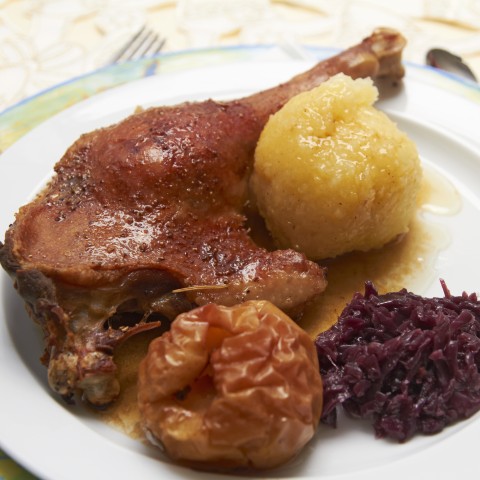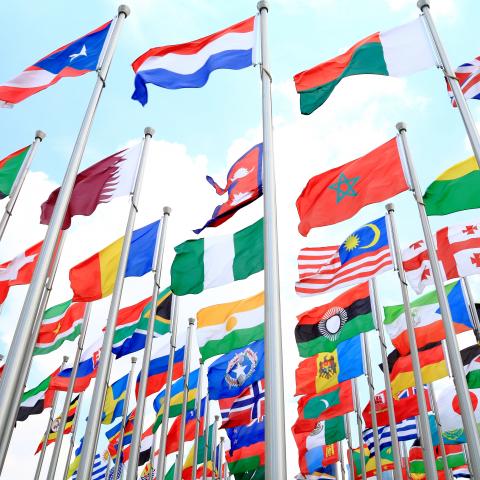Ever felt a little lost for words when speaking German?
Chances are, you were missing an adjective. You can’t get very far when describing something if you’re limited to only a handful of adjectives, at most.
“He’s a tall, muscular, bald guy…okay, I can say he’s tall…how about ‘bald?’”
That sentence can’t even get off the ground.
But here, with the information in this article, you’ll be able to learn German adjectives and confidently describe pretty much anything you need to, without breaking a sweat. Because 100 German adjectives is a lot!
In our German adjectives lesson, before our list, you’ll find the following information on how to use German adjectives:
- German adjectives rules
- German adjectives word order
- German adjective endings and how to conjugate them
- Tips on how to learn German adjectives
Let’s have a look.
Table of Contents
- A Quick Overview of German Adjectives
- Top 100 German Adjectives List
- Add a Few Words and Make Your Meaning More Exact
- How to Go Beyond German Adjectives Vocab to Total Mastery
1. A Quick Overview of German Adjectives
It’s entirely possible that German adjectives are some of the most complex things in the German language. There’s no getting around the fact that there’s a lot to master.
So how do German adjectives work?
Very briefly, when used in front of a noun, adjectives in German decline, that is, their endings change in order to give extra information about the grammatical function of that noun.
- Ich sehe einen alten Mann.
I see an old man.
Here, the adjective alt, meaning “old,” takes the ending -en to show that the noun, Mann, is the direct object of the sentence. English doesn’t make this kind of distinction, so it’s a little tricky to get your mind thinking in that way at first.
Fortunately, such changes don’t happen at all when the adjective comes after the noun.
- Meine Mutter ist alt.
My mother is old.
Same word, no ending. No problem!
In this article, we’ll list out the most important German adjectives you need to know, giving you the root form at first and then declined forms in the sentence. If you haven’t already, check out our information on German cases, and then you can exercise your grammar knowledge by figuring out what case the adjective is in!
One other note before our German adjectives list: German doesn’t distinguish between adjectives and adverbs. So it’s possible to use quite a few of these as adverbs instead; in fact, that’s what we did in a few examples, where the adverb meaning is more easily understandable to you.
2. Top 100 German Adjectives List
1- German Colors Adjectives: Describing Colors
Colors help us distinguish objects from one another, and color words help us communicate with others exactly which one we’re talking about.
1. weiß – white
Ich habe ein weißes Kissen.
I have a white pillow.
2. schwarz – black
Ist dein Auto schwarz?
Is your car black?
3. blau – blue
Sie trägt blaue Jeans.
She’s wearing blue jeans.
4. rot – red
Wo sind meine roten Socken?
Where are my red socks?
5. gelb – yellow
Hast du meine gelben Stiefel gesehen?
Have you seen my yellow boots?
6. grün – green
Er hat mir eine grüne Krawatte gegeben.
He gave me a green tie.
7. braun – brown
Magst du braune Schuhe?
Do you like brown shoes?
8. rosa – pink
Ihre Haare sind rosa.
Her hair is pink.
9. orange – orange (Note that in German, this word is pronounced in the French way, with a nasal A and a ZH sound)
Was für ein schönes oranges Kleid!
What a beautiful orange dress!
10. grau – gray
Der Himmel ist heute grau.
The sky is gray today.
2- German Adjectives for Food: Describing Taste
You’re not limited to just German food when you speak German. Use these words to order what you’d like or insult what you don’t—the choice is yours!
11. scharf – spicy
Indisches Essen ist oft scharf.
Indian food is often spicy.
12. würzig – spicy, with a lot of spices
Das ist zu würzig für mich.
That’s too spicy for me.
13. süß – sweet
Schoko-Eis ist süß.
Chocolate ice cream is sweet.
14. lecker – tasty
Das ist richtig lecker!
That’s really tasty!
15. frisch – fresh
Gibt es hier frische Milch?
Is there fresh milk here?
16. gebraten – fried
Gebratene Eier sind gesund.
Fried eggs are healthy.
17. stinkend – stinky
Magst du stinkenden Tofu?
Do you like stinky tofu?
18. salzig – salty
Das Abendessen war ein bisschen zu salzig.
Dinner was a little too salty.
19. bitter – bitter
Warum ist die Suppe bitter?
Why is the soup bitter?
20. sauer – sour
Die Milch ist schon sauer.
The milk is sour already.
21. roh – raw
Bitte geben Sie mir nichts rohes.
Please don’t give me anything raw.
3- German Adjectives for Personality
People you meet on the street come in all kinds. Everybody has a unique personality, and it’s high time that you started talking about them in German.
22. offen – open-hearted; personable
Er ist definitiv ein offener Mensch.
He’s definitely an open person.
23. tolerant – tolerant (the stress in German is on the last syllable)
Sind die Leute hier tolerant?
Are the people tolerant here?
24. hilfsbereit – helpful; ready to help
Ja, sie sind immer hilfsbereit.
Yes, they’re always ready to help.
25. geduldig – patient
Mein Vater ist nicht geduldig.
My father is not patient.
26. klug – clever
Die Studenten sind sehr klug.
The students are very clever.
27. böse – evil
Die böse Hexe lebt im Wald.
The evil witch lives in the forest.
28. egoistisch – selfish; egoistic
Sei nicht so egoistisch.
Don’t be so selfish.
29. faul – lazy
Warum musst du immer faul sein?
Why do you have to be so lazy all the time?
30. brav – well-behaved (used for children)
Braves Kind!
Wonderful child!
31. gefährlich – dangerous
Es ist zu gefährlich!
It’s too dangerous!
4- German Adjectives: Feelings & Emotions
A lot of Germans think that just saying “I’m fine” when they ask how you’re doing is a little bit superficial, or even rude. Here’s how you can learn to be more specific and more honest.
32. genervt – annoyed
Warum bist du genervt?
Why are you annoyed?
33. froh – happy
Ich bin immer froh zuhause.
I’m always happy at home.
34. müde – tired
Meine Mutter ist abends immer müde.
My mom is always tired in the evenings.
35. hungrig – hungry
Ich bin hungrig, aber ich will hier nichts essen.
I’m hungry, but I don’t want to eat anything here.
36. traurig – sad
Was für ein trauriger Film!
What a sad movie!
37. gespannt – excited
Seid ihr alle gespannt?
Are you all excited?
38. übel – nauseated; queasy
Mir ist auf einmal übel.
I’m queasy all of a sudden.
39. bequem – comfortable
Dieser Rock ist nicht bequem.
This skirt is not comfortable.
40. wütend – angry; furious
Bitte sei nicht so wütend auf ihn.
Please don’t be so angry with him.
5- German Adjectives for Describing Nationality
Take care in this section. In German, adjectives describing countries are never capitalized, as they are in English. This is one of the biggest giveaways that you might be a non-native German writer!
41. deutsch – German
Deutsches Essen ist nicht sehr bekannt.
German food is not very well-known.
42. französisch – French
Ist er französisch oder kanadisch?
Is he French or Canadian?
43. dänisch – Danish
Die dänische Küste ist kalt.
The Danish coast is cold.
44. ungarisch – Hungarian
Willst du einen ungarischen Film sehen?
Do you want to watch a Hungarian film?
45. chinesisch – Chinese
Chinesische Bücher sind sehr lang.
Chinese books are very long.
46. südafrikanisch – South African
Er spielt für die südafrikanische Mannschaft.
He plays for the South African team.
47. mexikanisch – Mexican
Es gibt nicht so viele mexikanische Restaurants in Europa.
There aren’t many Mexican restaurants in Europe.
48. kanadisch – Canadian
Haben Sie kanadischen Speck?
Do you have Canadian bacon?
6- German Adjectives for Describing Time
Some days pass pretty fast, and others pass pretty slow. These words can be used as adverbs and adjectives without any difference.
49. schnell – fast
Die Züge in Japan sind schnell.
The trains in Japan are fast.
50. langsam – slow
Die Nachrichten sind heute langsam.
The news is slow today.
51. früh – early
Ich muss heute früh schlafen.
I need to sleep early tonight.
52. spät – late
Seien Sie Morgen nicht spät.
Don’t be late tomorrow.
53. pünktlich – punctual; on time
Sie ist immer pünktlich.
She’s always on time.
7- German Adjectives for Describing Appearance (People)
Never be rude when describing others—just be discreet. Hopefully, you can use these words to more accurately describe yourself as well!
54. glatzköpfig – bald
Der Mann war glatzköpfig.
The man was bald.
55. dick – fat
Sie sind ein bisschen dick geworden.
They got a little fatter.
56. dünn – thin
Wieso ist er so dünn?
How is he so thin?
57. reich – rich
Ich möchte nächstes Jahr reich sein.
I want to be rich next year.
58. arm – poor
Warum gibt es immer noch arme Leute?
Why are there still poor people?
59. groß – tall
Sie ist ziemlich groß für ein Mädchen.
She’s pretty tall for a girl.
60. alt – old
Wie alt bist du?
How old are you?
61. jung – young
Der junger Mann hat mir geholfen.
The young man helped me.
62. schön – beautiful
Du bist sehr schön heute!
You’re very beautiful today!
8- German Adjectives for Describing Appearance (Things)
Going shopping in Berlin, comparing your stuff with your friend’s, or just trying to find that one thing you misplaced? These are the essential German adjectives you can’t live without.
63. teuer – expensive
Warum sind sie so teuer?
Why are they so expensive?
64. billig – cheap
Trägst du billige Kleidung?
Do you wear cheap clothes?
65. breit – wide; broad
Die Straße ist nicht breit.
The road is not wide.
66. lang – long
Der Brief ist lang and traurig.
The letter is long and sad.
67. schwer – heavy
Das ist zu schwer, und ich kann es nicht ziehen.
That’s too heavy, and I can’t pull it.
68. leicht – light
Haben Sie einen leichten Karton?
Do you have a light cardboard box?
69. dick – thick
Das Buch ist dick und schwer.
The book is thick and heavy.
70. eng – narrow
Es gibt wahrscheinlich Spinnen in diesem engen Flur.
There are probably spiders in this narrow corridor.
71. hier – here
Bist du schon hier?
Are you here yet?
72. da – there
Siehst du das Gebäude da?
Do you see that building there?
73. dort – there (far away)
Sie wohnt in den Bergen dort.
She lives in yonder mountains.
74. hell – bright
Das Zimmer ist hell und bequem.
The room is bright and comfortable.
75. dunkel – dark
Warum ist es so dunkel hier?
Why is it so dark here?
9- German Weather Adjectives: Describing Weather
Here are some of the most useful adjectives for talking about weather—always a good icebreaker. We actually have a whole separate resource on weather words, so pop over and check that one out too!
76. windig – windy
Heute ist ein windiger Tag.
Today is a windy day.
77. heiß – hot
Das Wetter heute ist heiß.
The weather today is hot.
78. kalt – cold
Es kann sehr kalt sein in Kanada.
It can be very cold in Canada.
79. sonnig – sunny
Gestern war es schön und sonnig.
Yesterday, it was beautiful and sunny.
80. bewölkt – cloudy
Der Himmel ist immer noch bewölkt.
The sky is still cloudy.
81. neblig – foggy
Es ist immer neblig auf dem Gipfel.
It’s always foggy on the mountain.
82. warm – warm
Heute ist nicht so warm als gestern.
Today is not as warm as yesterday.
10- German Adjectives for Describing Touch
Touch is slightly different than appearance. As we all know, appearances can be deceiving!
83. hart – solid; fixed
Das Glas ist sehr hart.
The glass is very hard.
84. weich – soft; smooth
Das Bett ist weich.
The bed is soft.
85. rutschig – slippery
Pass auf, der Boden ist rutschig.
Be careful, the floor is slippery.
86. brüchig – brittle; fragile
Es ist 2019 und Handys sind immer noch brüchig.
It’s 2019 and phones are still fragile.
87. gefroren – frozen
Ich bin fast gefroren hier draußen.
I’m almost frozen out here.
88. geschmolzen – melted
Ich mag kein geschmolzenes Eis.
I don’t like melted ice cream.
11- German Adjectives for Describing Concepts
Ever tried to explain something to somebody else and they just balk at your attempt? It’s much easier if you can reassure them that it’s easy, or better yet, that it’s related to something they’re already familiar with.
89. wichtig – important
Vergiss nicht, das hier ist sehr wichtig.
Don’t forget, this is very important.
90. populär – popular
Die Zeitschrift ist nicht so populär.
The magazine is not very popular.
91. leicht – easy
Das ist leicht zu verstehen.
This is easy to understand.
92. schwer – difficult
Es ist schwer für mich, Deutsch zu sprechen.
It’s difficult for me to speak German.
93. kompliziert – complicated
Ist Esperanto eine komplizierte Sprache?
Is Esperanto a complicated language?
94. richtig – correct
Was du sagst ist richtig.
What you say is correct.
95. falsch – false
Das war eine falsche Antwort.
That was a wrong (false) answer.
96. praktisch – practical; convenient
Kinokarten übers Handy kaufen zu können ist praktisch.
Buying tickets for the movies using the phone is convenient.
97. identisch – identical
Du hast zwei identische Alternativen.
You have two identical options.
98. unterschiedlich – different
Sind sie überhaupt unterschiedlich?
Are they different at all?
99. genau – exact
Das ist genau was ich sagen wollte.
That’s exactly what I wanted to say.
100. ungefähr – about; roughly
Es gibt ungefähr zweihundert Tiere im Zoo.
There are about two hundred animals in the zoo.
3. Add a Few Words and Make Your Meaning More Exact
As you’ve probably noticed, we didn’t just stick with the bare adjectives. In German, just like English, you can add intensifiers to your adjective to alter the meaning.
One of the most common intensifiers is sehr, or “very.” Wirklich, ganz, and echt fill the same role, though echt is rather informal. All of these simply make any given adjective stronger.
On the other end of the spectrum, you’ll commonly see nicht, meaning “not.” Slap a nicht in front of any adjective, and you’ve got a perfect remedy when you can only remember the opposite. Don’t know how to say “rich?” “Not poor” does the trick in a pinch! See why learning German adjectives and their opposites is a great idea?
4. How to Go Beyond German Adjectives Vocab to Total Mastery
How many different German adjectives can you still recall? Are these important German adjectives already fading from your memory? Go back and have another look, and then maybe again tomorrow. Even better—read the sentences aloud. You’ll find that a lot of these adjectives stick without any effort.
Understanding German adjectives does take time and effort, but rest assured that it will pay off in the long run!
And if you’d like to learn even more, have a look at the other German material we have on this very website: videos, flashcards, and of course our flagship podcast.
Before you go, let us know in the comments which of these German adjectives are your favorite. Are there any adjectives in German you still want to know? We look forward to hearing from you!



















